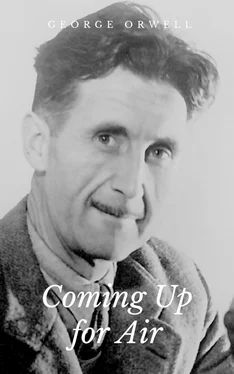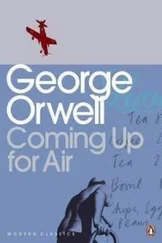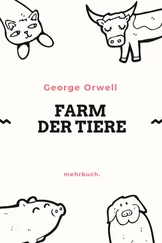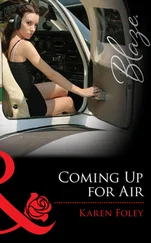The chap who'd borrowed my matches was having a good pick at his teeth over the Express.
'Legs case don't seem to get much forrader,' he said.
'They'll never get 'im,' said the other. ''Ow could you identify a pair of legs? They're all the bleeding same, aren't they?'
'Might trace 'im through the piece of paper 'e wrapped 'em up in,' said the first.
Down below you could see the roofs of the houses stretching on and on, twisting this way and that with the streets, but stretching on and on, like an enormous plain that you could have ridden over. Whichever way you cross London it's twenty miles of houses almost without a break. Christ! how can the bombers miss us when they come? We're just one great big bull's-eye. And no warning, probably. Because who's going to be such a bloody fool as to declare war nowadays? If I was Hitler I'd send my bombers across in the middle of a disarmament conference. Some quiet morning, when the clerks are streaming across London Bridge, and the canary's singing, and the old woman's pegging the bloomers on the line—zoom, whizz, plonk! Houses going up into the air, bloomers soaked with blood, canary singing on above the corpses.
Seems a pity somehow, I thought. I looked at the great sea of roofs stretching on and on. Miles and miles of streets, fried-fish shops, tin chapels, picture houses, little printing-shops up back alleys, factories, blocks of flats, whelk stalls, dairies, power stations—on and on and on. Enormous! And the peacefulness of it! Like a great wilderness with no wild beasts. No guns firing, nobody chucking pineapples, nobody beating anybody else up with a rubber truncheon. If you come to think of it, in the whole of England at this moment there probably isn't a single bedroom window from which anyone's firing a machine-gun.
But how about five years from now? Or two years? Or one year?
4
I'd dropped my papers at the office. Warner is one of these cheap American dentists, and he has his consulting-room, or 'parlour' as he likes to call it, halfway up a big block of offices, between a photographer and a rubber-goods wholesaler. I was early for my appointment, but it was time for a bit of grub. I don't know what put it into my head to go into a milk-bar. They're places I generally avoid. We five-to-ten-pound-a-weekers aren't well served in the way of eating-places in London. If your idea of the amount to spend on a meal is one and threepence, it's either Lyons, the Express Dairy, or the A.B.C., or else it's the kind of funeral snack they serve you in the saloon bar, a pint of bitter and a slab of cold pie, so cold that it's colder than the beer. Outside the milk-bar the boys were yelling the first editions of the evening papers.
Behind the bright red counter a girl in a tall white cap was fiddling with an ice-box, and somewhere at the back a radio was playing, plonk-tiddle-tiddle-plonk, a kind of tinny sound. Why the hell am I coming here? I thought to myself as I went in. There's a kind of atmosphere about these places that gets me down. Everything slick and shiny and streamlined; mirrors, enamel, and chromium plate whichever direction you look in. Everything spent on the decorations and nothing on the food. No real food at all. Just lists of stuff with American names, sort of phantom stuff that you can't taste and can hardly believe in the existence of. Everything comes out of a carton or a tin, or it's hauled out of a refrigerator or squirted out of a tap or squeezed out of a tube. No comfort, no privacy. Tall stools to sit on, a kind of narrow ledge to eat off, mirrors all round you. A sort of propaganda floating round, mixed up with the noise of the radio, to the effect that food doesn't matter, comfort doesn't matter, nothing matters except slickness and shininess and streamlining. Everything's streamlined nowadays, even the bullet Hitler's keeping for you. I ordered a large coffee and a couple of frankfurters. The girl in the white cap jerked them at me with about as much interest as you'd throw ants' eggs to a goldfish.
Outside the door a newsboy yelled 'Starnoosstan nerd !' I saw the poster flapping against his knees: LEGS. FRESH DISCOVERIES. Just 'legs', you notice. It had got down to that. Two days earlier they'd found a woman's legs in a railway waiting-room, done up in a brown-paper parcel, and what with successive editions of the papers, the whole nation was supposed to be so passionately interested in these blasted legs that they didn't need any further introduction. They were the only legs that were news at the moment. It's queer, I thought, as I ate a bit of roll, how dull the murders are getting nowadays. All this cutting people up and leaving bits of them about the countryside. Not a patch on the old domestic poisoning dramas, Crippen, Seddon, Mrs Maybrick; the truth being, I suppose, that you can't do a good murder unless you believe you're going to roast in hell for it.
At this moment I bit into one of my frankfurters, and—Christ!
I can't honestly say that I'd expected the thing to have a pleasant taste. I'd expected it to taste of nothing, like the roll. But this—well, it was quite an experience. Let me try and describe it to you.
The frankfurter had a rubber skin, of course, and my temporary teeth weren't much of a fit. I had to do a kind of sawing movement before I could get my teeth through the skin. And then suddenly—pop! The thing burst in my mouth like a rotten pear. A sort of horrible soft stuff was oozing all over my tongue. But the taste! For a moment I just couldn't believe it. Then I rolled my tongue round it again and had another try. It was fish ! A sausage, a thing calling itself a frankfurter, filled with fish! I got up and walked straight out without touching my coffee. God knows what that might have tasted of.
Outside the newsboy shoved the Standard into my face and yelled, 'Legs! 'Orrible revelations! All the winners! Legs! Legs!' I was still rolling the stuff round my tongue, wondering where I could spit it out. I remembered a bit I'd read in the paper somewhere about these food-factories in Germany where everything's made out of something else. Ersatz, they call it. I remembered reading that they were making sausages out of fish, and fish, no doubt, out of something different. It gave me the feeling that I'd bitten into the modern world and discovered what it was really made of. That's the way we're going nowadays. Everything slick and streamlined, everything made out of something else. Celluloid, rubber, chromium-steel everywhere, arc-lamps blazing all night, glass roofs over your head, radios all playing the same tune, no vegetation left, everything cemented over, mock-turtles grazing under the neutral fruit-trees. But when you come down to brass tacks and get your teeth into something solid, a sausage for instance, that's what you get. Rotten fish in a rubber skin. Bombs of filth bursting inside your mouth.
When I'd got the new teeth in I felt a lot better. They sat nice and smooth over the gums, and though very likely it sounds absurd to say that false teeth can make you feel younger, it's a fact that they did so. I tried a smile at myself in a shop window. They weren't half bad. Warner, though cheap, is a bit of an artist and doesn't aim at making you look like a toothpaste advert. He's got huge cabinets full of false teeth—he showed them to me once—all graded according to size and colour, and he picks them out like a jeweller choosing stones for a necklace. Nine people out of ten would have taken my teeth for natural.
I caught a full-length glimpse of myself in another window I was passing, and it struck me that really I wasn't such a bad figure of a man. A bit on the fat side, admittedly, but nothing offensive, only what the tailors call a 'full figure', and some women like a man to have a red face. There's life in the old dog yet, I thought. I remembered my seventeen quid, and definitely made up my mind that I'd spend it on a woman. There was time to have a pint before the pubs shut, just to baptize the teeth, and feeling rich because of my seventeen quid I stopped at a tobacconist's and bought myself a sixpenny cigar of a kind I'm rather partial to. They're eight inches long and guaranteed pure Havana leaf all through. I suppose cabbages grow in Havana the same as anywhere else.
Читать дальше












